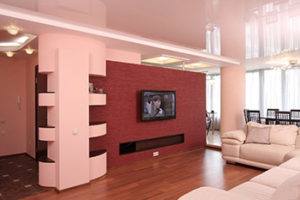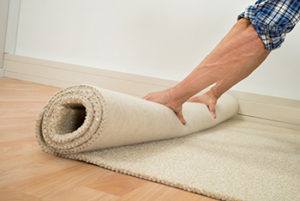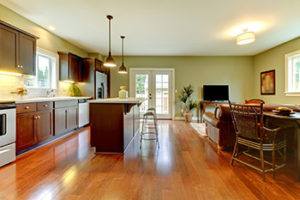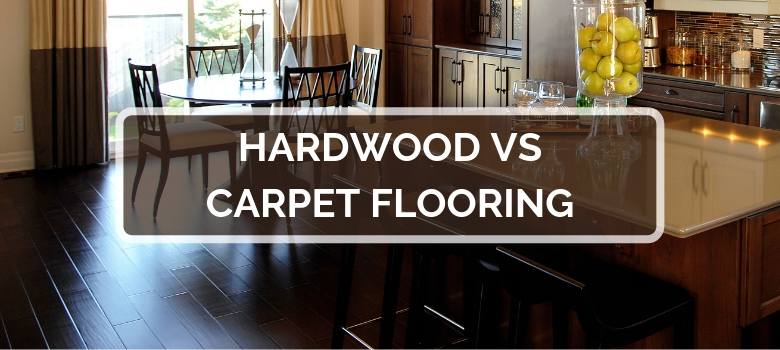While the jury is still out on hardwood flooring vs carpet flooring, each homeowner needs to consider their own unique situation and budget in making their decision. A careful comparison may provide much-needed insight before you spring for an option you may regret.
Which is better, hardwood or carpet? The answer to this question depends on a number of factors. While both are classical and popular flooring options, they have very little in common when it comes to their unique characteristics. The right decision will depend on your tastes, budget, and needs.
In this guide, we’ll explore:
- Comparison
- Cost & Installation
- Resale Value
- Versatility
- Appearance
- Cleanliness & Care
- Hypoallergenic Choices
- Pet-Friendly Floors
- Durability
- Sustainability
- Comfort
- Safety
- Insulation & Noise Reduction
- FAQs
- The Verdict
Side-By-Side Comparison
| Hardwood | Carpet | |
|---|---|---|
| Cost & Installation | Much more expensive | Budget-conscious |
| Resale Value | Adds value; attracts more buyers | Good value at cost efficiency; quick face-lift |
| Versatility | Not suited to high-moisture rooms like bathrooms, laundries, and kitchens | Not all types are suitable for high-moisture areas, like bathrooms, laundries, and kitchens |
| Appearance | Classic; more luxurious looking | Still a good option; many colors to select from |
| Cleanliness & Care | Easier to see dirt and to clean | Dirt can hide; harder to clean |
| Hypoallergenic Choices | Less microbial build-up; allows regular and quick cleaning | Can develop allergy-causing microbial load; requires regular deep cleaning |
| Pet-Friendly Floors | Easier to clean spills; noisy and scratchy with pet nails | Soft and comfortable for pets; can become soiled with pet waste |
| Durability | Susceptible to spills and dings, but lasts much longer | Spills can be cleaned, but flooring needs to be replaced much fore frequently |
| Sustainability | Natural, sustainable, and environmentally-friendly | Made mostly from petroleum; not natural |
| Comfort | Harder material; not as comfortable | Softer material; more comfortable |
| Safety | Possible tripping hazard; no cushion | Safer because it's soft and is cushioned |
| Insulation & Noise Reduction | Colder and noisier | Warmer and quieter |
| Flooring Guide | Hardwood Flooring Guide | Carpet Flooring Guide |
Cost And Installation
Cost is a major factor in any purchasing decision when it comes to flooring. When you’re choosing between hardwood flooring and carpet, there is a substantial difference in price, especially if you are considering the top-end options. If you are on a tight budget, this might eliminate hardwood flooring as an option altogether.

Hardwood flooring is one of the more expensive types of flooring on the market. That is because it is made from a natural product– trees– and is not engineered to replicate another product. For this reason, hardwood flooring can be much more expensive than carpeting.
In most cases, hardwood flooring can cost between $9 to $12 per square foot, including installation. However, some of the higher-end options can cost even more. Reclaimed wood, for example, could cost as much as $30 per square foot.
Installing a hardwood floor can cost an average of $120 or more per 100 square foot space, making this quite a pricey option, as it excludes labor. A DIY installation can save you money, but if the job is badly done, it can quickly become a money pit when enlisting experts in to help fix an error.
Correctly fitting floorboards requires technical knowledge such as dealing with interlocking systems, leaving sufficient expansion room, and correctly finishing the boards to ensure a longer life span.
Carpet, on the other hand, is definitely a much more budget-friendly option. Most carpet options cost between $3 and $5 a square foot installed, with padding and all. Some of the higher-end carpet options could come in closer to $10 a square foot.
DIY carpet installation may seem easy; however, without the right tools, knowledge, and sufficient labor, it, too, can become costly. Carpeting requires stretching when you fit it to ensure it doesn’t run or cause unsightly folds. This might be best left to the experts, which could increase your installation costs.
Resale Value
Most home buyers prefer to have a hard flooring surface such as hardwood or ceramic tiles, as these are easiest to clean and tend to hide flaws the best. Estate agents agree that when it comes to carpet or hardwood flooring, hardwood wins out each time.
You can expect a return on investment (ROI) of 70 to 80% on hardwood flooring. And hardwood flooring increases a home’s value by up to 10%. Additionally, estate agents indicate that selling a home with hardwood flooring is a substantially easier process than selling a home with other flooring types.
Buyers are weary of a beautiful carpet hiding hideous mold and flaws in the substructure, so their eagerness to invest in homes with hardwood flooring definitely makes more sense.
However, your budget is also a consideration when choosing whether to install hardwood flooring or carpeting. A higher-quality carpet that fits your budget will turn more heads than poor-quality hardwood flooring that you installed yourself since you ran over budget.
If you are intent on selling your property soon, then choosing a decent-quality carpet will not break the bank, and will give your home a face-lift. This improvement will definitely add value to your home.
Versatility
Hardwood and carpet flooring both offer great appeal throughout the home; however, areas where there are high levels of moisture such as bathrooms, kitchens, and laundries are not all that suitable for either flooring type.
Moisture can become trapped in carpets and also in hardwood floors, leading to the expansion of materials, increased wear, and potential damage through mold and rot.
The best flooring material for areas that have frequent contact with damp and liquid spills is ceramic tile. Ceramic tiles are available in a wood look, which can offer a safer and cleaner alternative for moisture-rich environments.
That being said, a properly-sealed hardwood floor can repel the occasional spill and prevent moisture from seeping into the surface. This makes it a suitable choice in guest bathrooms, which don’t see as much use.
The costs of properly (and regularly) cleaning, buffing, and coating hardwood flooring can run up to $3.75 per square foot.
While carpets can be washed, a soiled or water-stained carpet is much harder to clean, and sometimes, this is not at all possible. Regularly applying a teflon coating to your carpets can make them water-repellent, though you would have to clean up any water spills as they happen.
Appearance
Another big difference between hardwood flooring and carpet is the appearance. It would be very hard to confuse the two types of flooring because of how different they look and feel. While there is a substantial difference between the feel of hardwood and carpeted floors, carpets are now available in wood-look too, thus increasing your decoration options. However, depending on your personal style and the style of your house, one flooring choice could be much better than the other.

Hardwood flooring is what could be called the “prestige” choice in flooring. That’s because today, hardwood flooring is seen as a high-end and luxurious option. The current design trends are definitely leaning toward hard flooring surfaces, and wood fits in perfectly with these trends.
While wood has traditionally been the classic look for homes, it has reclaimed its preferred status as flooring of the elite with most homeowners. Hardwood flooring can adapt a sleek, rustic, timeless, and luxurious look, depending on its finish. This is why many people prefer installing hardwood flooring over carpet.
An excellent feature of hardwood flooring is that it can take on many different appearances. The different types of wood – such as oak and pine – will have a different architectural finish and quality. Plus, there are many stains available on the market that you can apply to treat a hardwood flooring, changing its appearance from light to dark or a shade somewhere in between.
Carpet has a much different look than hardwood flooring does. That is not to say that it has a cheaper look than hardwood flooring. In fact, many people still prefer the look of carpeting, especially in certain rooms of the house.
The great thing about carpet when it comes to appearance is you can choose just about any color under the sun. This makes carpet a very versatile flooring choice, as you can mix and match colors and shades based on other design choices in the room. Carpeting can also look firm or plush, depending on the type of loom and pile you choose.
Cleanliness And Care
Hardwood flooring and carpet are also very different when it comes to the cleaning and care required for each. Each flooring type has its pros and cons in this regard. So which is better, hardwood or carpet?
Hardwood flooring is easier to maintain with basic cleanup on a daily basis. That’s because it doesn’t require deep cleaning too often. In fact, it is advisable that you avoid using liquid cleaning products on hardwood floors because these could warp and damage the natural fibers that make up the floorboards.
It is easier to spot dirt and dust on a hardwood floor than on carpet. As a result, it’s easier to notice when your floor needs a wipe or a good cleaning. For hardwood flooring, cleaning includes a recommended sweep and vacuum (with a hardwood vac) at least a few times a week to maintain its appearance and condition.
Carpet, on the other hand, is a little tougher to keep clean. Dirt, dust, pollen, and other allergens can easily get stuck within the fibers of a carpet and stay hidden from sight. That’s why carpets are sometimes a poor choice in high-traffic areas like the hallway, kitchen, and living room. It is also not always suitable as a flooring for families with pets.
Carpet requires vacuuming and/or sweeping at least once a week. Thinking longer term, your carpet will also require more in-depth shampooing at least once a year. The frequency of cleaning needed will also depend on how much traffic your carpet sees, the level of wear and tear, and the color you choose.
Hypoallergenic Choices
Hardwood floors offer simpler cleanliness. The smooth surface doesn’t retain microbial particles, and if regularly cleaned, even the joints between boards can be freed of allergens. The sealants used can, however, present a problem to those with allergies.
If you need to have your hardwood floors resealed, such a job may require you to vacate your home for several hours– if not days– until the chemicals released by the sealants have dissipated. Fortunately, this is not a routine inconvenience, as hardwood floors only need to be resealed every 7 to 10 years.
Carpeting has traditionally been considered an unwise flooring choice if you suffer from allergies. The looms and tufts act like magnets to microparticles such as dust, pollen, and other allergy-causing microbes.
To prevent your carpets from becoming a health hazard, it is advisable to invest in a high-quality vacuum cleaner to remove the buildup of dust and other particles daily.
Such upkeep should prove sufficient to maintain a low level of allergens in your lovely rugs; however, people with severe allergies are advised to opt for a hard flooring such as hardwood, ceramic, or laminate.
Pet-Friendly Floors
In a home with pets, your choice in flooring needs to be carefully considered. Hardwood flooring certainly offers some serious bonus points for keeping your pooch happy. It’s easier to clean up spills, and when you are potty training your puppy, it’s easy to wipe up messes. Hardwoods are also hard-wearing.
However, dogs and even cats can cause serious and costly damage to your hardwood floors. Their nails not only cause scraping in the floor’s surface, requiring more frequent resurfacing, but they also can also create the tell-tale clicky-click sound that may drive you mad!
Pets are creatures of habit, and they prefer to lie in the same spot daily. Your lovely Great Dane may end up causing a serious dent in the sunny spot by the window over a few months, necessitating the introduction of a strategically-placed area rug.
When your puppy starts teething, you may be in tears when they decide to have a chew at a cornice or floorboard by the stairs. Fortunately, you can remove or repair a single floor board to fix up doggy damage.
In contrast, carpets are not always the wisest choice for homes with pets, either. Dogs shed and they carry in contaminants and foreign materials with them when they enter your home. These could result in hard-to-clean stains.
While teflon coating is helpful for a pet-friendly home, it doesn’t guarantee your carpet’s lifespan. Areas where your dog prefers to lie will suffer, causing your carpet to wear unevenly. Again, you might need to place area rugs to stop wear-and-tear and hide unsightly damage.
Durability
When you are considering the durability of hardwood flooring versus carpet, there are a few different angles that you must consider. Not only do you have to take into consideration the overall lifespan of the flooring type, but you should also weigh the impact of your daily life on it.

Your habits, visitors, pets, foot traffic through your home, and a multitude of other factors will influence the flooring type you should choose. While durability is a consideration, your choice always comes back to the cost of installation and maintenance versus the long-term cost of choosing a cheaper material.
In terms of daily life, hardwood flooring is very susceptible to damage from spills or rough usage. That’s because the material itself is natural and softer in its composition. Hardwood floors can warp with exposure to too much liquid and can dent or scratch from furniture movement or shoe traffic, especially from high heels.
Because of this, many families implement a “no shoes” policy on their hardwood floors. This helps to keep the flooring protected from scrapes and dents caused by shoes or debris that shoes may drag into the house. It’s also why people sometimes shy away from installing hardwood floors in bathrooms or kitchens.
Hardwood is designed to last. If you care for it properly, some hardwood flooring can last up to 100 years before you need to fully replace it. And if the floor starts to fade, you can sand, re-surface and re-stain a hardwood floor several times in its lifespan, depending on the thickness of the boards used.
In the short term, carpet can be the more forgiving flooring type. While indentations can be made on carpeting, it’s not as susceptible to scraping from heavy furniture or other dings. You can also use furniture coasters to help minimize damage. Spills on carpets can be a nightmare, but most can be scrubbed clean with proper care.
In the long term, though, carpet is not the most durable flooring option. That’s because if a rip, tear, or permanent stain occurs, you must replace at least the damaged section. In addition, a carpet floor will need a full replacement every five to 15 years, depending on wear and tear.
Sustainability
The next point of discussion in the hardwood versus carpet debate is what each product is composed of. This topic is especially important today, as people are becoming more conscious of their purchases’ ecological impact and carbon footprint.
Hardwood flooring is natural and ecologically friendly. This is because wood is, of course, a natural material; trees can be replanted when they are cut down. Be sure to research the company producing the hardwood for your boards if you want to be extra environmentally-conscious.
Carpet, meanwhile, is made mostly from petroleum. It’s not a material most people would consider natural or sustainable in any way. In fact, petroleum is an extremely limited resource and linked to an increase in pollution.
Comfort
For some people, it all comes down to comfort when they are choosing a flooring type for their homes. It’s more about how a floor treatment feels than whether the style is trendy. This can be especially true depending on which room you are outfitting with either a hardwood or carpeted option.
As no surprise, hardwood flooring is a harder material than carpet. It can often be tougher on your feet, especially when you are standing for long periods of time. Hardwood is also not that comfortable to kneel or lay on, which can be important factors if you have children who will be in the room a lot.
Carpet, meanwhile, is a much softer and more comfortable material. It’s plush and soft and very easy on your feet and your body. It’s one of the main reasons why people choose carpet over hardwood in waterproof basements, family rooms, and bedrooms.
Safety
Safety should be a major concern when you are making a choice between types of flooring, for whatever room you might install it in.
Hardwood flooring is not as safe when compared to carpet. That’s because over time, individual planks in the flooring could rise or lift, which could result in a tripping hazard. In addition, as a hardwood floor ages, it’s possible that nails in it could start to rise above the floor level, which can be very dangerous if someone steps or trips on them.
By comparison, carpeting is a much safer flooring type for the simple fact that it’s so much softer. It isn’t as much of a concern when it comes to tripping, and if a fall does occur, there is padding to help protect you from a hard landing. This cushioning also helps protect against dropped objects breaking and scattering, such as glass, which could result in dangerous cuts and scrapes.
Insulation And Noise Reduction
Temperature and noise might not be the first things that come to your mind when you are choosing between flooring types. However, each type of floor will have a big effect on both the warmth and noise level in your home. So which is better, hardwood flooring or carpet?
Hardwood is a colder and noisier flooring type because it doesn’t have sound or temperature absorbent properties.
Carpet is the complete opposite when it comes to insulation and noise. It has absorption properties, which makes it a much warmer surface and much more comfortable in the colder months. Carpet also absorbs noise, reducing the decibel level in rooms that have it installed as opposed to hardwood, which is known to echo.
FAQs
Choose a prefinished board that has been engineered to minimize waste and cost. Be sure to choose a time of year that is suitable for installation. Damp weather is not an optimal environment for hardwood flooring installations.
Is Carpeting Warmer Than Wood Flooring?
Yes, but only when the carpet is not glued directly onto concrete. A pad or underfelt is required to ensure the carpet is proofed against cold from the floor beneath. Wood floors allow cold air to move through between individual boards.
High-quality, low-pile carpets can sustain high volumes of foot traffic, as long as it is kept level and smooth, to avoid irregular wear. Hardwood floors can warp and move, causing tripping hazards. Overall, using a harder flooring surface such as hardwood floors will still be the better option when compared to carpet which can show wear more easily. As a bonus, hardwood floors clean easier, so those frequently trafficked areas can be more easily cleaned.
The Verdict
As you can see, there are many factors you must consider when comparing hardwood flooring versus carpet. The answer to the question, “Which is better?” really depends on your particular situation, budget, and taste.
Because of its classic style, look, and overall luxurious appearance, many people would prefer to install hardwood flooring. Even though it is more expensive than carpet, hardwood may be worth the extra money upfront because it will ultimately last much longer than carpet, and also offers a substantial ROI.
Because of its makeup and features, hardwood flooring is a great option for main living areas of the home, but it might not be the best option for basements, kitchens, and bathrooms.
Carpet, meanwhile, is a much more budget-conscious flooring option. However, that doesn’t mean it’s cheap, and it isn’t a perfect choice for certain rooms and family dynamics. Yet, carpet is plush, warm, comfortable, safe, and reduces noise.
Because of these factors, carpet is a great choice for bedrooms, less-formal family rooms, and waterproof basements, especially if you have children in your home. At the same time, pros do not suggest carpets for bathrooms, kitchens, or laundry rooms because of the potential for substantial water exposure.
Which flooring type do you prefer in your home and why? Do you have hardwood flooring in your living areas or carpet in your bedrooms? We’d love to hear from you, so leave us a comment below. Happy flooring!
Back to Top
